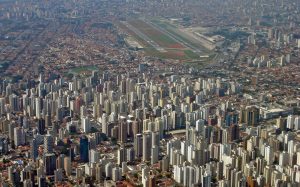São Paulo Program establishes four Working Groups

Copyrights 2008 mariordo@aol.com
Sao Paulo, July 2017 – An agreement was signed with the São Paulo Secretariat of Water Resources and Sanitation, laying the foundation for a comprehensive program of joint action. Also since July 2017, a 2030 WRG Representative is based in Sao Paulo in order to set-up and lead the program.
Since then, the 2030 Water Resources Group has been developing intense activities in two large macro themes that have been chosen as significant to advance the water security goals in the State. These are: (1) the reuse of effluents from Domestic Sewage Treatment Stations and (2) the poor performance of sanitation services in small and medium-sized municipalities (of less than 300,000 inhabitants).
Four Working Groups are being established to foster dialogue and transparency in seeking good solutions for those issues. Three of these Working Groups are already well-established and a fourth one is being organized with the participation of key decision-makers and with very clearly defined objectives:
- The first Working Group supports the discussions on the environmental and sanitary regulation of reuse of effluents from Sewage Treatment Stations in the State of São Paulo. The aspect to be discussed initially refers to its use for sanitary equipment. The Working Group allows stakeholders to articulate, facilitate understanding with regulatory and control bodies, consolidate experiences and try to make regulation adaptable and replicable. At the same time, this working group should support companies to comply with recent regulations. As there are several initiatives to regulate this theme in São Paulo and Brazil in general, it is important to consolidate existing experiences and knowledge to support decisions at private and public sectors.
- The second Working Group has been established with Sabesp, the water utility company of São Paulo and largest public water utility in Latin America, and aims to study the viability of new production and commercialization units of effluents from sewage treatment stations. It might be possible today to overcome the challenges that has been addressed by different studies in the past, since the water stress of the region has become clearer, requiring expansion of measures to rationalize the use of water resources; the technologies became more affordable, and also the deindustrialization of the region that has led to a reduction of the industrial effluents received by the treatment station made the treatment cheaper.
- The third Working Group focuses on a topic that overlaps urban and water issues. It is supporting a discussion about the technical and financial feasibility of retrofitting storm water reservoirs, which will be supplemented with compact treatment stations.
- The fourth Working Group, involving the State Secretariat of Sanitation and Water Resources, discusses and seeks to characterize the dynamics that lead to the poor performance, in terms of water and sanitation, of some small and medium sized municipalities (less than 300 thousand inhabitants) in the State. It aims to support the State in its usual funding programs and to provide solid basis for further investments of different origins.
As these groups begin their work, 2030 WRG also continues to reach out to local stakeholders to present our activities and dynamics. The reception so far has been very good, and at each meeting we realize that our presence and performance can be significant to support changes towards greater security in the water sector.
